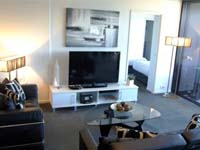
Court rules for short stays
The Victoria Supreme Court has awarded victory to operators Docklands Executive Apartments in the long-running dispute over short-stay apartments in residential buildings. On May 30 Justice Beach ordered the Docklands Watergate test-case back to the Building Appeals Board.
Justice Beach has instructed the BAB to hear the case again, saying that the board incorrectly interpreted the Building Code of Australia.
The decision effectively means that short-stay apartments in residential buildings are here to stay as it is widely expected that the new BAB panel is unlikely to find against the short-stay industry.
In March the BAB upheld building orders the City of Melbourne had issued against Docklands Executive Apartments operator Paul Salter in 2011. Mr Salter appealed the decision of the BAB at the Supreme Court.
Justice Beach included the following reasons were among those provided in his determination;
• The BAB misinterpreted the building code when it gave the term “dwelling”, as it is used in the definition of a Class 2 building, a temporal requirement;
• Despite the BAB being described by council’s lawyers as an “expert tribunal” it does not have jurisdiction to commit errors of law;
• That there was no evidence of a “changed use” as referred to by the BAB in the reasons for its decision; and
• That the building act did not permit a building notice to be served unless the building was a danger and that there was no evidence that the apartments themselves constituted a relevant danger.
The Watergate building is a Class 2 residential building according to the Building Code of Australia but council argued that short-stay apartments fall within the Class 3 classification, usually reserved for hotels and rooming houses.
However, strata title specialist firm Teys Lawyers says that short-term use of residential apartments is set to end following the decision. According to a media statement, Teys maintains, “The decision means residential class 2 apartments can’t be used for short-term accommodation such as the ‘serviced accommodation’ offered by Docklands Executive Apartments.”
Tom Bacon of Teys Lawyers, for the owners corporation, says serviced accommodation like this within a residential class 2 building will now be deemed a change of use and a new occupancy permit will be required to protect the life and safety of all residents.
“All buildings where this occurs will need to take steps to stop the practice, otherwise strata insurance policies may be cancelled in the event of an accident involving short stay guests,” Mr Bacon said. “Without strata insurance cover, unit owners and executive committee members might be personally liable for personal injury and property damage of those using the buildings unlawfully.”

AccomNews is not affiliated with any government agency, body or political party. We are an independently owned, family-operated magazine.







